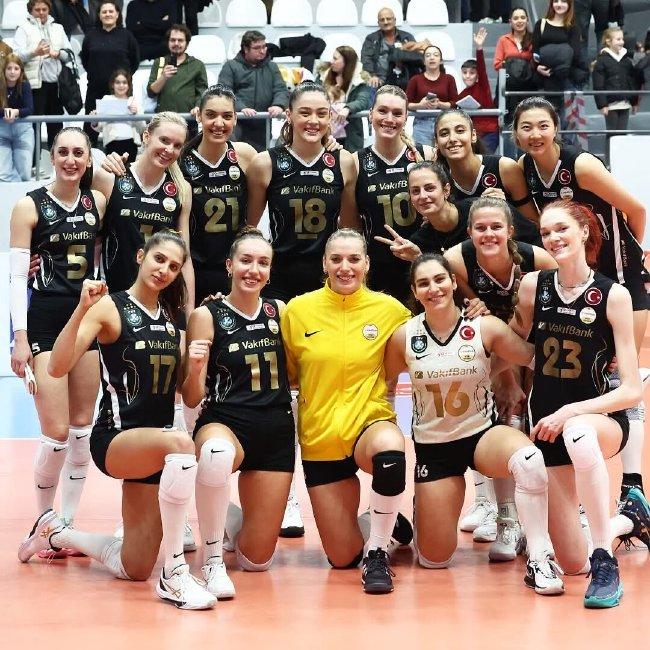天天体育嘉年华jnh9998官网邀请版appv5.9.13-嘉年华jnh9998-嘉年华娱乐jnh9998-嘉年华国际jnh9998
大小:986.6m 语言:简体中文
下载:604 系统:android2.9.x以上
更新时间:2025-10-04 00:53:54
特别推荐
软件介绍:
天天体育嘉年华jnh9998官网嘉年华jnh9998官网
 瓦基弗银行女排获胜后合影
瓦基弗银行女排获胜后合影
北京时间1月🎭27日凌晨,2024-2��📛��0👑25👚赛季土超女排联赛第18轮较量全部结束。袁心玥加盟的瓦基弗银行客场3-0击败排名垫底的萨勒耶尔,斩🐘获第15场胜利后积44分仍列第3,三🐐局比分为25-23、25-19和25-17。此役袁心玥进入参赛名单但没有🏚出场。
与排名垫底的萨勒耶尔交手,瓦基弗银行派出替补阵容主打🌃,先发亮相的是主攻马尔科娃(俄罗斯)、弗兰蒂(美国),副攻阿克巴依、乌亚尼克,接应基普😚(美国),二传西拉和自由人阿卡尔(萨里奥格卢)。技高一筹的瓦基弗银行女排直落三局完胜闯关。
此役瓦基弗银行的🛥主攻马尔科娃力夺17分,接应基普和主攻弗兰蒂分获13分和➖12分,两副攻乌亚尼😤克和阿克巴依均赢得7分,二换三替补登场的接应范赖克(加拿大)和二传奥兹巴依分别进账4分和1分。
 伊
伊在本轮焦点战中,伊萨奇巴希客场3-2逆袭击败同为15胜2负的领头羊费内巴切,涉险赢得第😀16场胜利后反超对手升至🦈榜首,五局比分为16-25、25-21、23-25、25-19和15-11。落败的费内巴切与瓦基弗银行同🅱为15胜3负,积48分排名次席。
在这场榜首之争中,费内巴切首发派出主攻费多罗夫采娃(俄罗斯)📿、安娜·克里斯蒂娜(巴西),副攻艾达、卡拉奇,接应瓦尔加斯🌳,二传德尔察(塞尔维亚)和
本场较量伊萨奇巴希

软件app
- 向协同创新要生产力按《京津冀人才一体化发展规划(2017—2030年)》的定位,北京为京津冀原始创新人才发展极,天津为京津冀高端制造人才发展极,河北则为京津冀创新转化人才发展极。
- 昨天(11月2日),北京市气象台发布了京城初雪后的天气走势。据悉,此次降温只是暂时的,预计在11月4日和5日气温会大幅回升,最高气温可达15℃至17℃。本周五、六最高气温甚至可达到20℃。因此,市民依然可以趁着秋高气爽的天气出游。
- 隨著今年3月份原主任胡凱調任貴州金融控股集團有限責任公司董事長,貴州省聯社主任一職暫處於空缺狀態
- 首先是医药,有消息称,美国的《生物安全法》未被纳入美参议院《2025财年国防授权法案》
- 短期来看,随着各大巨头的退场以及tcl的收购行动,在lcd及其相关技术领域,tcl确实拥有绝对的话语权
点评安装
- 积极、快乐、阳光,这是一个崭新的张帅,而这样的改变要归功于上赛季结束后的6周艰苦冬训。
- 从1988年成立至今,虽然经历了由公有制到混合所有制的改革,但公司形成的红色文化底色没有变,全体员工爱党爱国的情怀没有变
- 预计这一趋势将持续至下半年,盈利前景可能会进一步改善,首选股仍为腾讯,看好偏重服务业的美团等
- 他指出:“从披露数据 ( 3t)来看,7月份的购买使乌兹别克斯坦央行从净卖家变成了净买家
- 截至发稿,该股报0.067港元/股,成交量4000股,换手率0.00%,振幅0.00%
点评官方版
泛茶的工商經營內容沒有任何金融的政府、媒體和政府無數次對所謂的投資者和經驗者提供警示 图:未来科学大奖捐赠人邓锋公布2024未来科学大奖-物质科学奖获奖者名单,物质科学奖奖项委员会代表邓力宣读获奖理由图:邓力进行获奖成果解读图:现场连线2024未来科学大奖-物质科学奖获奖者张涛 张涛教授在连线中表达了对团队、嘉年华娱乐jnh9998的合作伙伴及家人的感谢,并简要介绍了化学及催化剂的重要性you know what i don’t like about these cops? that they’re reckless with life. that’s who i don’t trust: people reckless with life. those who call for violence, who support it, overtly or silently, are the foundation of many complex contemporary social ills. luke yi
yildirim:
看点网讯www zlook com 由宁浩执导的疯狂系列第三部《疯狂的外星人》历时5个月拍摄,日前在长沙正式杀青,官方也在第一时间对外公布了首批剧照和花絮,主演造型正式曝光。自14年《心花路放》
シソンヌ:
ранее wikileaks обнародовал электронную переписку демократической партии сша. из опубликованных документов следует, что партийный аппарат демократов во время праймериз работал на клинтон в ущерб ее конкуренту берни сандерсу. скандал стал причиной отставки руководителя национального комитета демократической партии.
胡志敏:
the judge said he is not sure whether a commission of between 1.5% and 4% of the “net value of certain assets recovered” was part of the worsley deal. otkritie has sought no freeze over worsley’s bank accounts or property; there are no criminal charges against worsley in the russian, swiss, british or cypriot courts. how much worsley may have concealed from yurov in order to benefit himself the judge didn’t venture to guess.
本杰明·鲁茨:
创造性思维很重要
斯里纳加:
rio de janeiro — it is not uncommon for the olympics to leave behind some unneeded facilities. rio, however, is experiencing something exceptional: less than six months after the summer games ended, the host city’s olympic legacy is decaying rapidly. empty olympic buildings abound, puncturing any uplifting buzz from the competitions last summer. at the olympic park, some stadium entrances are boarded up, and screws are scattered on the ground. the handball arena is barricaded with metal bars. the broadcast center remains half disassembled. the pool is decorated with piles of dirt and puddles. deodoro, a neighborhood in rio’s poor periphery, has the cluster of olympic sites. the canoe slalom course was to be converted into a giant public swimming pool. it closed to the public in december. today, residents fill plastic pools a few hundred feet away. “the government put sugar in our mouths and took it out before we could swallow,” luciana oliveira pimentel, a social worker from deodoro, said as her children played in a plastic pool. “once the olympics ended, they turned their backs on us. ” olympic officials and local organizers often boast about the legacy of the games — the residual benefits that a city and country will experience long after the competitions end. those projections are often met with skepticism by the public and by independent economists, who argue that olympic bids are built on wasted public money. rio has quickly become the latest, and perhaps the most striking, case of unfulfilled promises and abandonment. “it’s totally deserted,” said vera hickmann, 42, who was at the olympic park recently with her family. she lamented that although the area was open to the public, it lacked basic services. “i had to bring my son over to the plants to go to the bathroom,” she said. at the athletes’ village, across the street from the park, the 31 towers were supposed to be sold as luxury condominiums after the games, but fewer than 10 percent of the units have been sold. across town at maracanã stadium, a soccer temple, the field is brown, and the electricity has been shut off. “the government didn’t have money to throw a party like that, and we’re the ones who have to sacrifice,” ms. hickmann said, referring to local taxpayers. in the preparations for the games, the city of rio promised “no white elephants” and outlined plans for facilities to be turned into public sporting areas and schools. the arena that hosted taekwondo and fencing was to be transformed into a school. two other arenas were to be taken apart, and one put back together as four schools in another area. none of that has happened. the mayor’s office said those plans were still in the works, but it did not offer a specific timetable. the decay of olympic sites is happening as a financial crisis engulfs federal, state and municipal governments. “the nation is in crisis, rio de janeiro is in crisis — it’s time to be cautious,” marcelo crivella, who became mayor on jan. 1, told incoming city council members. “spending is prohibited,” he added. rio’s mayor during the games, eduardo paes, was among the strongest evangelizers of an olympic legacy. he said in an email that it was too soon to call any of the sites white elephants and that “the path to implementing a legacy has been given. ” after the games, the city held an auction for private companies to bid on administering the olympic park, but there were no bidders. that left the ministry of sport, an organ of the federal government, with the financial burden. the minister of sport, leonardo picciani, said in an interview that the agency’s goal was to find a private company to take over the park, but because there has been no interest, it is the government’s responsibility to maintain the sites. mr. picciani also said that the stadiums would not become burdensome relics, pointing to several sporting events scheduled for this year at olympic park, along with sports training programs. renato cosentino, a researcher at the regional and urban planning institute at the federal university of rio, who studies the olympic park region, said the park “was born as a white elephant,” because it was built in a wealthy suburb that is home to only about 5 percent of rio’s 6. 3 million residents. having the majority of investment there, he said, proves that the olympics were meant to serve real estate developers, who took on much of the construction for the games in exchange for being able to build on the land afterward, in what is known as a partnership. but even developers’ expectations have not panned out. the construction giants carvalho hosken and odebrecht took on the project of building the athletes’ village in hopes of selling the accommodations as luxury condominiums after the games, banking on the area’s becoming a desirable neighborhood for the city’s elite. in the 31 towers that make up the village, only 20 units have been sold since the beginning of the olympics in august, bringing the total sold to 260, out of 3, 604 apartments. in a scramble to sell off the apartments before carvalho hosken becomes responsible for about $6. 5 million in monthly interest payments (previously paid for by the local organizing committee for the olympics) the company is in the process of striking a deal with rio’s city government to sell them to civil servants, such as military personnel, at discounted prices with low interest rates, according to the brazilian newspaper o globo. rio’s prominent soccer stadium, the maracanã, which hosted the opening and closing ceremonies, has also fallen into disrepair, with a brown field, several thousand seats uprooted, televisions missing and nearly $1 million owed to the electricity company. the consortium that normally administers the stadium, maracanã s. a. claims that rio 2016 and the rio state government did not hold up their end of a contract that required them to maintain the stadium and return it in the state in which it was given to them. the deodoro neighborhood was a favorite talking point for olympic officials before and during the games. several sites — including those for equestrian events, shooting and field hockey — were constructed there, heralded as a shining example of how the olympics can lift a blighted area. the flagship, however, was the giant swimming pool, used as the canoe slalom course, which opened to the public before the games. when the pool opened, mr. paes, the mayor at the time, beamed. “we’ve made an early legacy here,” he said. “i think this is something in the history of the olympics. ” the pool is now closed, though temperatures are regularly in the 90s and the neighborhood is a long bus ride from rio’s beaches. the current mayor, mr. crivella, again said the city intended to reopen the pool as soon as possible, but he did not forecast a date. close by, the triângulo favela community was disrupted to make way for rapid bus lines that were expanded before the olympics. several homes and the community’s plaza, its main leisure space, were removed by the construction. today, a turnaround for the buses looms over where the plaza used to be, but residents have no access to the buses. they say they were promised a bus terminal and a new leisure space, but neither has come. “the government, business people — they tricked us,” said camila felix muguet, 36, who lost part of her home and her backyard to the project. “they came, they robbed, and they said goodbye. now they’re gone, and where are our upgrades?” ms. pimentel, the deodoro resident whose children were playing in a plastic pool, said she had always suspected that the public pool might not last. “the olympics ended, deodoro ended,” she said, shaking her head. “we’re going to be forgotten. ”
张呈:
无论是阻击病毒的传播蔓延,还是抵御不断恶化的全球经济衰退,都需要国际社会团结合作,都需要坚持多边主义、推动构建人类命运共同体。